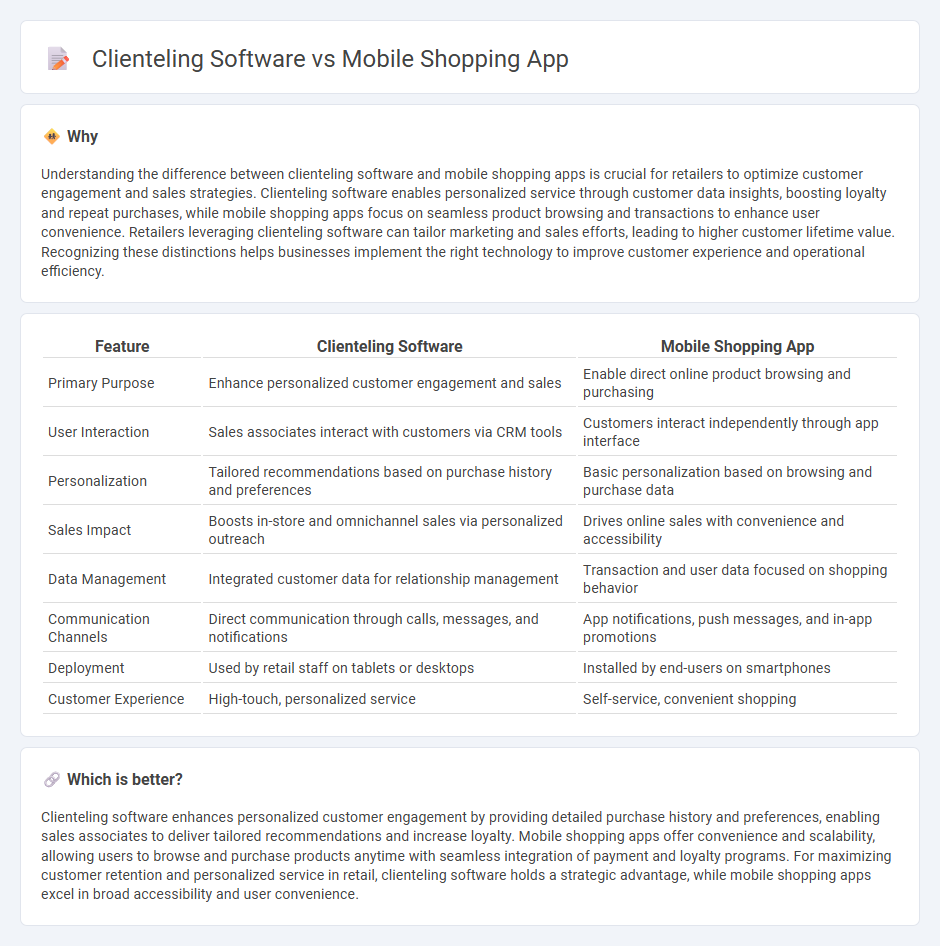
Clienteling software enhances personalized customer experiences by leveraging purchase history and preferences to deliver targeted recommendations and exclusive offers, fostering long-term loyalty in retail environments. In contrast, mobile shopping apps focus on convenience and accessibility, enabling users to browse, purchase, and track orders anytime from their smartphones with seamless interface designs. Explore how integrating clienteling software and mobile apps can revolutionize your retail strategy for maximum customer engagement and sales growth.
Why it is important
Understanding the difference between clienteling software and mobile shopping apps is crucial for retailers to optimize customer engagement and sales strategies. Clienteling software enables personalized service through customer data insights, boosting loyalty and repeat purchases, while mobile shopping apps focus on seamless product browsing and transactions to enhance user convenience. Retailers leveraging clienteling software can tailor marketing and sales efforts, leading to higher customer lifetime value. Recognizing these distinctions helps businesses implement the right technology to improve customer experience and operational efficiency.
Comparison Table
| Feature | Clienteling Software | Mobile Shopping App |
|---|---|---|
| Primary Purpose | Enhance personalized customer engagement and sales | Enable direct online product browsing and purchasing |
| User Interaction | Sales associates interact with customers via CRM tools | Customers interact independently through app interface |
| Personalization | Tailored recommendations based on purchase history and preferences | Basic personalization based on browsing and purchase data |
| Sales Impact | Boosts in-store and omnichannel sales via personalized outreach | Drives online sales with convenience and accessibility |
| Data Management | Integrated customer data for relationship management | Transaction and user data focused on shopping behavior |
| Communication Channels | Direct communication through calls, messages, and notifications | App notifications, push messages, and in-app promotions |
| Deployment | Used by retail staff on tablets or desktops | Installed by end-users on smartphones |
| Customer Experience | High-touch, personalized service | Self-service, convenient shopping |
Which is better?
Clienteling software enhances personalized customer engagement by providing detailed purchase history and preferences, enabling sales associates to deliver tailored recommendations and increase loyalty. Mobile shopping apps offer convenience and scalability, allowing users to browse and purchase products anytime with seamless integration of payment and loyalty programs. For maximizing customer retention and personalized service in retail, clienteling software holds a strategic advantage, while mobile shopping apps excel in broad accessibility and user convenience.
Connection
Clienteling software integrates seamlessly with mobile shopping apps to enhance personalized customer experiences by leveraging purchase history and preferences data. This connection enables sales associates to provide tailored recommendations and real-time inventory updates directly through the app, increasing customer engagement and loyalty. Mobile shopping apps supported by clienteling tools drive higher conversion rates by delivering customized promotions and facilitating smooth communication between consumers and retailers.
Key Terms
User Experience (UX)
Mobile shopping apps offer streamlined interface designs that enhance browsing efficiency, personalized recommendations through AI, and seamless payment gateways to elevate user satisfaction. Clienteling software prioritizes tailored customer interactions by equipping retail associates with real-time purchase history, preference data, and communication tools for a more personalized shopping journey. Explore the key differences in UX strategies to determine which solution best drives customer engagement and retention.
Personalization
Mobile shopping apps leverage user data and AI algorithms to deliver personalized product recommendations and customized shopping experiences, enhancing customer engagement and satisfaction. Clienteling software enables sales associates to access detailed customer profiles, purchase history, and preferences to provide tailored service and build long-term relationships. Explore how these technologies transform personalization in retail to boost loyalty and sales.
Customer Data Integration
Mobile shopping apps enhance customer experience by seamlessly integrating purchase history, preferences, and real-time behavior for personalized recommendations. Clienteling software excels in aggregating comprehensive customer profiles, including in-store interactions and loyalty program data, enabling more informed sales strategies. Discover how combining these technologies can maximize customer data integration and drive superior engagement.
Source and External Links
15 Best Shopping Apps in 2025 - MobiLoud - Popular mobile shopping apps include Temu, Shein, Amazon, Walmart, Home Depot, and Alibaba available on both iOS and Android platforms with features tailored for diverse shopping needs.
Shop: All your favorite brands - Apps on Google Play - The Shop app by Shopify consolidates shopping and package tracking, offering perks like Shop Cash rewards, one-tap checkout, flexible payments, and carbon-neutral deliveries.
The Home Depot Mobile App - The Home Depot app helps customers with project planning, product search via image recognition, store navigation, and various pickup or delivery options, designed for both professionals and DIYers.
 dowidth.com
dowidth.com